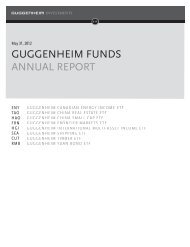Guggenheim Credit Allocation Fund GGM - Guggenheim Investments
Guggenheim Credit Allocation Fund GGM - Guggenheim Investments
Guggenheim Credit Allocation Fund GGM - Guggenheim Investments
- No tags were found...
You also want an ePaper? Increase the reach of your titles
YUMPU automatically turns print PDFs into web optimized ePapers that Google loves.
income the <strong>Fund</strong> actually received, and to sell portfolio securities, including at potentially disadvantageoustimes or prices, to obtain cash needed for these income distributions.Municipal securities riskThe amount of public information available about municipal securities is generally less than that for corporateequities or bonds, and the investment performance of the <strong>Fund</strong>’s municipal securities investments may thereforebe more dependent on the analytical abilities of the Adviser. The secondary market for municipal securities,particularly below investment grade municipal securities, also tends to be less well-developed or liquid thanmany other securities markets, which may adversely affect the <strong>Fund</strong>’s ability to sell such securities at pricesapproximating those at which the <strong>Fund</strong> may currently value them. In addition, many state and municipalgovernments that issue securities are under significant economic and financial stress and may not be able tosatisfy their obligations. The ability of municipal issuers to make timely payments of interest and principal maybe diminished during general economic downturns and as governmental cost burdens are reallocated amongfederal, state and local governments. Issuers of municipal securities might seek protection under bankruptcylaws. In the event of bankruptcy of such an issuer, holders of municipal securities could experience delays incollecting principal and interest and such holders may not be able to collect all principal and interest to whichthey are entitled. The <strong>Fund</strong> may invest in taxable municipal securities, which consist primarily of BuildAmerica Bonds (“BABs”). The issuance of BABs was discontinued on December 31, 2010. Under thesequestration process under the Budget Control Act of 2011, automatic spending cuts that became effective onMarch 1, 2013 will reduce the federal subsidy for BABs. See “Risks—Municipal Securities Risk.”Recent market developments riskGlobal and domestic financial markets have experienced periods of severe turmoil. The debt and equity capitalmarkets in the United States have been negatively impacted by significant write-offs in the financial servicessector relating to sub-prime mortgages and the re-pricing of credit risk, among other things. These events, alongwith the deterioration of the housing market, the failure of major financial institutions and the resulting UnitedStates federal government actions led to worsening general economic conditions, which materially andadversely impacted the broader financial and credit markets and reduced the availability of debt and equitycapital for the market as a whole and financial firms in particular. Such market conditions may increase thevolatility of the value of securities owned by the <strong>Fund</strong>, may make it more difficult for the <strong>Fund</strong> to accuratelyvalue its securities or to sell its securities on a timely basis and may adversely affect the ability of the <strong>Fund</strong> toborrow for investment purposes and increase the cost of such borrowings, which would reduce returns to theholders of Common Shares. These developments adversely affected the broader economy, and may continue todo so, which in turn may adversely affect issuers of securities owned by the <strong>Fund</strong>. Such developments could, inturn, reduce the value of securities owned by the <strong>Fund</strong> and adversely affect the net asset value of the <strong>Fund</strong>’sCommon Shares.Instability in the financial markets led the U.S. Government and other governments around the world to take anumber of actions designed to support certain financial institutions and segments of the financial markets thatexperienced extreme volatility, and in some cases a lack of liquidity. The long-term implications ofgovernment ownership and disposition of distressed assets and interests in financial institutions are unclear.Recently, markets have witnessed more stabilized economic activity as expectations for an economic recoveryincreased. However, risks to a robust resumption of growth persist. A return to unfavorable economic conditionsor sustained economic slowdown could adversely impact the <strong>Fund</strong>’s portfolio. Financial market conditions, aswell as various social and political tensions in the United States and around the world, have contributed toincreased market volatility and may have long-term effects on the U.S. and worldwide financial markets andcause further economic uncertainties or deterioration in the United States and worldwide. The Adviser does notknow how long the financial markets will continue to be affected by these events and cannot predict the effectsof these or similar events in the future on the U.S. and global economies and securities markets in the <strong>Fund</strong>’sportfolio. The Adviser intends to monitor developments and seek to manage the <strong>Fund</strong>’s portfolio in a mannerconsistent with achieving the <strong>Fund</strong>’s investment objective, but there can be no assurance that they will besuccessful in doing so.21



